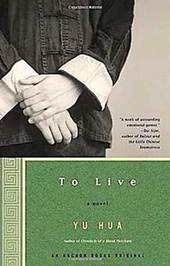Still, in a press release from the publishing team, Yu briefly defended himself, saying he didn't have to copy the daily news cycle because these issues have existed long enough to become part of our lives.
"It's best for me to present these absurd things all at once. I won't focus on one event like I did with Chronicle of A Blood Merchant. In that book, blood selling appears for only four times. I mainly write about their lives, which is what interests me. Blood selling is only a pretext," he says.
He's surprised, however, at how harshly the language of The Seventh Day has been criticized, given the fact that he has refined it numerous times.
"I'm narrating from the perspective of a dead man. The language should be restrained and cold. For the parts in the living world, I add some warmth. The language of a novel is not a random choice. It's decided by the nature of the novel itself," he says.
 |
| Yu hua's major works |
The powerlessness in the language is an artistic reflection of the sense many people have of feeling weak and helpless, says Fudan University's Chinese literature professor Zhang Xinying.
"He tells the stories through a dead man. I think the desperation expressed in this way is even more profound," he says.
Peking University's Chinese professor Chen Xiaoming says Yu's writing is valuable because he contrasts the desperation caused by social reality, amplifying the value of moral principles and love.
"I feel the cruelness of reality and I write equally cruelly, so I need the warmth. I need the kind part to give myself and the readers hope," Yu says.
Even in The Seventh Day that starts and ends with death, that can seem unrelentingly bleak, Yu has still created warmth.
It's the undisturbed relationship between the protagonist and his adoptive father, the selfless love of a young man who died after selling his only kidney to buy his dead girlfriend a tomb, and more importantly, the sympathy and affection the unsettled spirits show each other when they gather at the "land for the unburied", a place of peace and beauty.
"When I wrote the novel, I had a strong belief that I was writing about the real world as an inverted reflection. My focus is not the real world. It's the world of the dead," Yu says. "When the real world depresses you, I write down a beautiful dead world. This world is neither a Utopia nor a wonderland. But it's beautiful."
In this place, just as Yu writes at the end of the novel, "leaves wave to you, stones smile at you, the river greets you. No poor, no rich, no sorrow, no pain ... everyone dies equal".
Related:
|
|
|
A modern literary classic gets a stage makeover, touching the heartstrings of a new generation and cementing Huang Bo's status as one of China's most solid thespians. More...
Yu Hua revels in his exposes of the good, the bad and the ugly in his novel Brothers and its sequel. More...
|
|
|
|
|
|
|
|